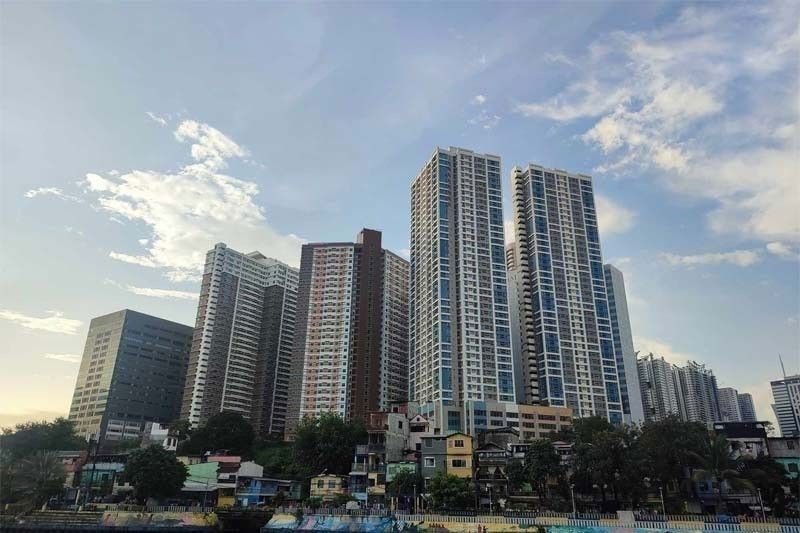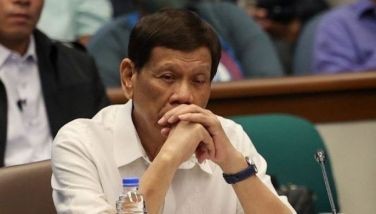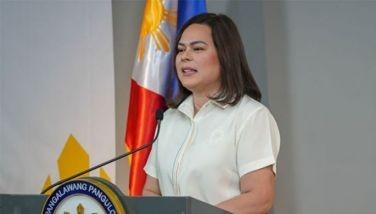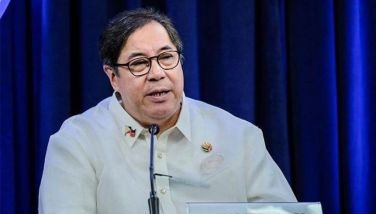Government lowers growth targets for 2024, 2025

Cites inflation risks, global slowdown, natural disasters
MANILA, Philippines — The Marcos administration has lowered its growth targets for this year as the country grapples with inflation-related risks, a global economic slowdown and the impact of natural disasters.
National Economic and Development Authority (NEDA) Secretary Arsenio Balisacan said economic managers have adjusted the gross domestic product (GDP) growth target for 2024 to six to seven percent from the original target of 6.5 to 7.5 percent.
The government also revised its economic growth target for next year to 6.5 to 7.5 percent from 6.5 to eight percent, but retained the 6.5 to eight percent goal for 2026 to 2028.
The GDP is the sum total of all goods and services produced in an economy in a given period. It is an indicator of the size of an economy.
“The revised targets for our headline indicators considered the country’s recent economic performance in fiscal year 2023 and reflect the latest developments and expectations on external factors such as global demand and trade growth, oil price movements, and expected exchange rate and inflation trends,” Balisacan said.
“We have seen (the) continuing slowdown of the global economy, and also taking into account the uptick in oil prices and as well the trends in inflation, interest rates not just in the Philippines but also in other countries, particularly all major trading partners such as the United States,” he added.
President Marcos and members of his Cabinet confirmed the macroeconomic targets approved by the Development Budget Coordination Committee (DBCC) during the 16th full Cabinet meeting yesterday.
Balisacan said economic risks on the horizon include climate change and extreme natural disasters such as El Niño, which may affect food security and price stability.
Risks related to inflation, such as the possible adjustments in transport fares, wages and service utility fees that are higher than expected, could dampen household consumption.
“On the external front, the global economic slowdown may weaken external demand, while increasing geopolitical and trade tensions could disrupt supply chains. Furthermore, general elections in major economies could lead to political shifts that may disrupt trade and investment,” the NEDA chief added.
Despite the lower growth targets, Balisacan expressed optimism about the Philippines’ economic prospects, saying “robust” macroeconomic fundamentals would support the growth trajectory.
“Even though the range has been reduced from 6.5 to 7.5 to now six to seven percent, that’s still very respectable even in the context of our... economic history but also, as I said earlier, in the context of our region, in the Asia-Pacific. We still remain one of the most fastest growing economies,” he said.
“For our people, of course that will mean that the jobs that are available will continue to be robustly provided,” he added.
Balisacan said the Marcos administration retained its inflation target range of two to four percent for 2024 through 2028, following its assessment of recent internal and external developments that impact the prices of major commodity groups.
The inflation outlook considers the monetary policy actions the Bangko Sentral ng Pilipinas is undertaking and the non-monetary strategies and measures the government is implementing, he added.
Higher revenues seen
While economic managers decided to cut growth targets, they expect revenues to hit P4.270 trillion or 16.1 percent of gross domestic product this year and P6.078 trillion or 16.4 percent of GDP by 2028.
The deficit-to-GDP ratio is seen to fall from 5.6 percent in 2024 to 3.7 percent by 2028, leading to an expected debt-to-GDP ratio of 60.3 percent in 2024 and 55.9 percent by 2028.
Balisacan said the government would further improve its fiscal performance through enhanced tax administration reforms focused on modernizing and enhancing the efficiency of the Philippine tax system.
“It’s chicken and egg. The lower GDP growth will obviously affect the BIR (Bureau of Internal Revenue) and BOC (Bureau of Customs) collections. But on the other hand, as I was saying earlier, improving tax administration will be the biggest source of that increase in revenues,” Balisacan said.
“So, in other words, even with the slightly lower growth forecast, revenues from these two agencies are expected to rise,” he said.
Balisacan said the executive branch would also work with Congress to pass priority tax reform measures to enhance revenue mobilization and “be more attuned to the country’s fiscal requirements and current domestic developments.”
Among the fiscal measures included in the common legislative agenda of the executive and legislative branches are the fourth package of the comprehensive tax reform program, the value added tax on digital service providers, the excise tax on single-use plastic bags and the excise tax on sweetened beverages and junk food.
The government’s disbursement program is seen to remain at about 20 percent of GDP or an expected P5.75 trillion in 2024 and P7.45 trillion by 2028.
2025 budget
According to Balisacan, the DBCC is proposing a P6.2 trillion national budget for 2025, with spending to remain focused on delivering high-impact and transformative public infrastructure projects and essential social services, especially for the poor and vulnerable. Next year’s outlay is equivalent to 21.4 percent of GDP and higher by 7.5 percent compared to the 2024 national budget.
“The budget shall support the Marcos administration’s Build-Better-More program to stay on course and maintain infrastructure spending between five and six percent of GDP from 2024 through 2028,” Balisacan said.
The administration, the NEDA chief said, continues to recognize and promote the crucial role of the private sector investments in delivering public infrastructure and services to alleviate the burden on the government’s limited fiscal space.
He expressed optimism that the full implementation of economic liberalization, investment-related, and business-friendly reforms and initiatives, including the recently enacted Public-Private Partnership Code and its implementing rules and regulations, would pave the way for greater investor interest and activity in the Philippines.
“We also expect the President’s aggressive investment and trade promotion initiatives to continue to bear fruits as more and more recognize the country’s promise as a destination of choice for businesses,” Balisacan said.
The administration also expects the Pambansang Pabahay Para sa Pilipino national housing program to boost the mining and manufacturing sectors due to the projected increase in the demand for construction materials.
“Also, our higher growth forecast for the transport and digital sectors can be attributed to the foreseen impact of the Public Service Act on critical digital and physical connectivity infrastructure in the years to come,” Balisacan said.
- Latest
- Trending

























